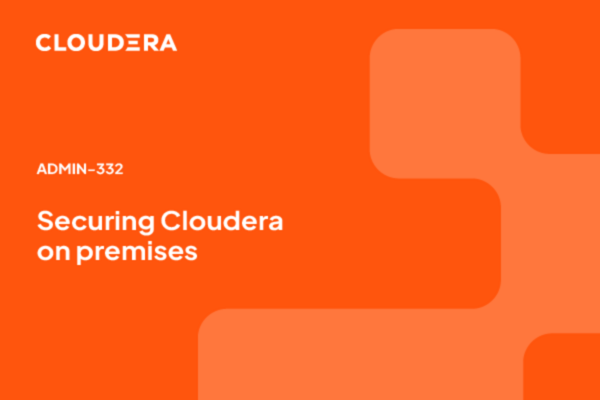Upcoming Sessions
-
March
5
ILT - Cloudera Custom Training - ADMIN-238 Administrating Kubernetes - 4935622 - AMER 1
Starting:2026/03/05 @ 09:00 AM Central Time (US & Canada)Ending:2026/03/05 @ 05:00 PM Central Time (US & Canada) -
March
9
ILT - ADMIN-280: Administering Cloudera on cloud - 4937164 - public
Starting:2026/03/09 @ 09:00 AM PretoriaEnding:2026/03/12 @ 05:00 PM Pretoria
See All Upcoming Sessions

DATE: March 17, 2026 9:00 - 17:00 (SGT TIMEZONE) Virtual Classroom, APAC Read more

DATE: June 4, 2026 9:00 - 17:00 (CEST TIMEZONE) Virtual Classroom, EMEA Read more

DATE: May 7, 2026 9:00 - 17:00 (CEST TIMEZONE) Virtual Classroom, EMEA Read more

DATE: April 2, 2026 9:00 - 17:00 (CEST timezone) Virtual Classroom, EMEA Read more
.png)
This training provides a comprehensive understanding of the steps required to configure, operate, and maintain Cloudera on cloud instances. This four-day instructor-led course covers everything from setup to configuring various data services to executing workloads on AWS, Azure, and GCP using Cloudera Management Console. The course covers configuration options using the web interface, as well as automation scenarios using Ansible. On the optimization side, it covers load balancing and tuning Cloudera on cloud instances. This course equips participants to effectively address the real-world challenges faced by administrators running Cloudera on cloud. What You’ll Learn Through instructor-led discussion and interactive, hands-on exercises, you will learn how to: • Evaluate and select the appropriate deployment option • Setup Cloudera using Cloudera Management Console • Setup and configure various data services • Configure and monitor instances using Cloudera Manager • Optimize cluster performance and security • Detect, troubleshoot, and repair problems with the cluster • Auto scale Data Hub clusters and Data Services What to Expect This course is best suited to cloud systems administrators and operators who have at least basic Linux and AWS/Azure/GCP experience. Prior knowledge of Cloudera is not required, but helpful. DATE: April 13-16, 2026 9:00 - 17:00 (CEST TIMEZONE) Virtual Classroom, EMEA Read more

Overview The Cloudera platform is intended to meet the most demanding technical audit standards. The significant improvements in Cloudera architecture and components make Cloudera “Secure by Design.” This four-day hands-on course is presented as a project plan for Cloudera administrators to build fully secured Cloudera clusters. The course begins with implementing Perimeter Security by installing host level security and Kerberos. Next, students protect Data by implementing Transport Layer Security using Auto-TLS and data encryption using Key Management System and Key Trustee Server (KMS/KTS). Following this, in the third stage, students control access for users and to data using Apache Ranger and Apache Atlas. The fourth stage focuses on visibility practices, teaching students how to audit systems, users, and data usage. Finally, the course introduces Cloudera practices for Risk Management in a fully secured Cloudera platform. This course is 60% exercise and 40% lecture. Who should take this course? This immersion course is designed for Linux Administrators transitioning to Cloudera Administrator roles. Students must have proficiency in Linux (e.g., navigating the file system, using basic commands) and Linux text editors (e.g., vi, nano). Familiarity with Directory Services, Transport Layer Security, Kerberos, and SQL select statements is recommended. Prior experience with Cloudera products is required. Students must have reliable internet access to connect to the classroom environments hosted on Amazon Web Services. DATE: March 17-20, 2026 9:00 - 17:00 (GMT+1 TIMEZONE) Virtual Classroom, EMEA Read more
Shopping Cart
Your cart is empty
